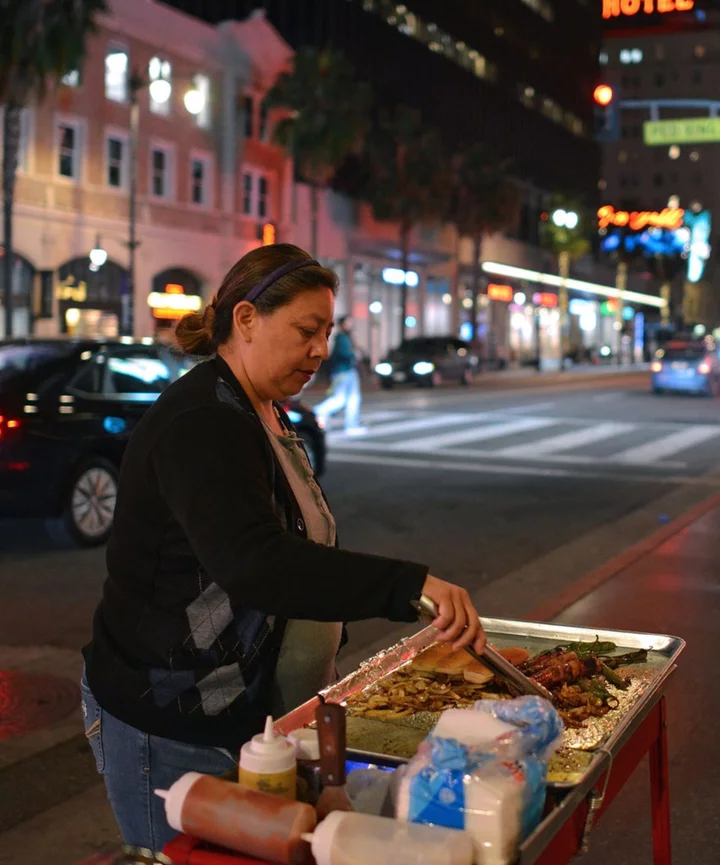In February 2023, a video of women harassing a Mexican street vendor in California seared through social media. It not only sparked outrage, but it forced viewers to confront a cruel reality: U.S. street vendors, many of whom come from Latin America, are one of the most vulnerable workforces in the country. In 2022, the Los Angeles Police Department received 156 reports of crimes committed against street vendors from January 1 to July 31 — a 52.9% increase from the same period in 2021. As usual, Latines are stepping up to protect our own and have spearheaded street vendor advocacy initiatives nationwide.
“An acquaintance let me know there was a really big need for Spanish speakers to connect with street vendors who were impacted by Covid-19,” Steffany Cielo, Program Coordinator at New York City-based organization Street Vendor Project, tells Refinery29 Somos. In 2021, she officially joined the group, which was created through the Urban Justice Center to address recent increased vendor restrictions. Today, SVP is the city’s only organization advocating for street vendors.
“A lot of the time, we’re providing political education to street vendors so they’re fully aware of the system that they’re participating in,” Cielo explains. “We try to remind them that they are small businesses — they’re the smallest businesses that exist. As business owners, they have accessibility to things like E-payment systems and marketing opportunities, small things that really get them the exposure they need, and that little boost of confidence that they can transfer to everything.”
“The violence some of these vendors are encountering — some haven’t survived these hate crimes. We have to make sure we protect them, that we invest in them, because they have the rest of us in mind.”
Diana DiazFor decades, street vendor advocacy has been a critical movement for Latines in the U.S. Los Angeles’s first records of Mexican street vendors date back to the 1930s. In the 1980s, the city outlawed street vending amid a rise in Latin American immigrants. Since then, the street vendor economy has been targeted in countless “improvement” plans for cities across the country, like New York’s 2022 “quality-of-life” initiative, which charges vendors a $1,000 fine for operating without a permit. Coupled with the nation’s existing anti-Latine sentiments, these policies set the stage for a rise in street vendor harassment, which makes Latines’ presence in advocacy work more important than ever.
“We’re eliminating the shame behind street vending,” says Diana Diaz, founder of the nonprofit The Goddess Mercado and Board Member for Open Air Economy Collaborative, a Los Angeles initiative that invests in Black and Latina micro-entrepreneurs like street vendors. As a former vendor herself, Diaz knows the importance of advocacy. “The violence some of these vendors are encountering — some haven’t survived these hate crimes. We have to make sure we protect them, that we invest in them, because they have the rest of us in mind.”
Cielo emphasizes the importance of bilingual volunteers within organizations like SVP. “Often, vendors just need that voice of translation making sure their voices are the ones in the spotlight,” she says.
SVP provides legal services to vendors, like helping them secure a mobile food vending license. They also host resource fairs in each of New York City’s boroughs, through which they answer vendors’ questions and provide necessary items for their businesses. They even facilitate text message group chats for vendors, which Cielo says “create a basic network where they can sell their items, promote each other’s businesses, and keep each other aware of what’s going on in the streets.”
Diaz says Open Air Economy engages in similar work, like tabling at public marketplaces to share information about upcoming grants for street vendors. And through The Goddess Mercado, she’s personally taken several vendors under her wing. “I created a series of workshops where I share my knowledge and resources,” she explains. “Now, I’m getting training from Open Air Economy and learning about grants, access to capital, legal resources, and all of that so I can help the vendors I mentor.”
Cielo recently served as SVP’s Fund Excluded Worker Program Coordinator, through which she helped hundreds of vendors apply for cash assistance from the state of New York. “It was touching when folks were able to get cash assistance and say, ‘Wow, I can actually pay my rent and utility bills that were so behind,’” she says. “I really saw their relief just getting a little bit of a boost. I still get folks saying, ‘Oh my gosh, thank you,’ or remembering my face and being like, ‘You helped me with my application.’”
Outside of formal organizations like SVP and Open Air Economy Collaborative, young Latines have taken it upon themselves to protect their local vendors. San Diego-based TikToker Jesús Morales spends his free time distributing tips from followers to Latine street vendors. In April, he surprised three unsuspecting vendors with a day trip to Disneyland. That same month, street vendor activist Edin Alex Enamorado uploaded a video on TikTok of an administrator at the University of California Riverside campus telling a woman selling fruit near the school that she needed to leave. Later in the video, Enamorado visits the vice chancellor’s office to question him about the ejection.
“They’re the foundation of our evolving country, and they’re sharing and preserving ancestral traditions.”
DIANA DIAZ“They don’t necessarily feel comfortable being around folks that will educate them, so establishing those relationships is important,” Cielo says. If you’d like to become involved in street vendor advocacy but don’t know where to start, she recommends contacting local officials. “Call up your city council member and say, ‘Hey, how are you supporting street vendors? The street vendors here are amazing.’ They want to hear that street vendors are doing something positive because there can be a lot of calls stating the opposite.”
Diaz wishes more Americans knew what it really means to be a street vendor. “Our country was [largely] built by immigrants — our Latino street vendors are the same thing,” she says. “They’re the foundation of our evolving country, and they’re sharing and preserving ancestral traditions. We need people to accept immigrants who are raising children here for a better life, for opportunities, who want to improve our local economies.”
Cielo adds that many street vendors don’t actually choose the profession — often, it’s their only option. “A lot of our members at SVP are single mothers, so they can’t work a 9 to 5,” she says. “They may be elderly, they may be disabled. It’s important to take a step back and see, hey, this vendor is probably here for a reason other than the stereotypical ‘They don’t want to be part of the system.’ They desperately want to be part of the system. External factors just prevent them from participating.”









